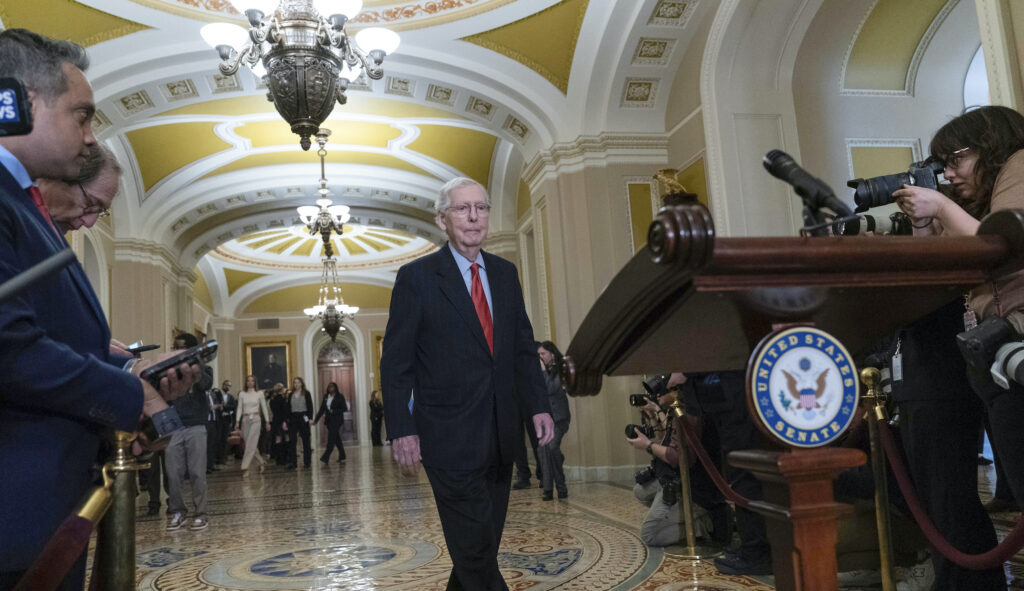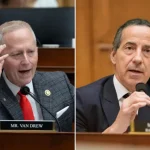
The dramatic collapse of the Senate border deal on Tuesday has left Republican leadership with no clear path forward on how to pass aid for Ukraine.
But Senate Minority Leader Mitch McConnell (R-KY) has a more stubborn problem on his hands: a conference in disarray and even outright rebellion.
Conservatives won a bitter fight over the border, convincing a majority of Senate Republicans to oppose legislation that Speaker Mike Johnson (R-LA) had already declared “dead on arrival” in the House.
Now, McConnell is left picking up the pieces with his hold on the conference freshly in doubt.
The gulf seems almost intractable.
McConnell had viewed border security as a way to unite Republicans increasingly split over funding for the Eastern European ally.
He demanded “credible” policy changes as the price to pay for the White House’s request for more than $60 billion in Ukraine funding, and, for a time, it seemed to bring the entire conference on the same page.
But the details of the legislation, plus a shifting political climate as former President Donald Trump became the likely GOP nominee for president, killed any hope the legislation could pass.
The bill became a messaging headache even before Senate negotiators unveiled the text on Sunday night.
As part of the deal, the White House agreed to shut down the border when crossings surge to 5,000 encounters a day, but the narrative, fueled by leaks, became that it would “codify” that level of illegal immigration.
The bill was dead within 24 hours of its release.
The only agreement among Republicans in the aftermath was that Sen. James Lankford (R-OK), the chief Republican negotiator in border talks, was not to blame.
McConnell commended him for producing a “quality product” in a divided government even as he conceded the deal had “no real chance” in a Tuesday press conference.

The problem was a matter of politics, not policy, McConnell told reporters.
“Things have changed over the last four months, and it’s been made perfectly clear by the speaker that he wouldn’t take it up even if we sent it to him, and so I think that’s probably why most of our members think we ought to have opposition tomorrow,” he said, alluding to a Wednesday test vote on the bill.
McConnell expressed hope that the Senate would move forward on a bill that funds Ukraine, Israel, and Taiwan, as the original legislation would have done, but leaves behind the border component.
Yet the hoped-for Plan B is not likely to quell conservative discontent within his conference. Minutes before McConnell took to the podium, Sen. Ted Cruz (R-TX) called on him to step down as minority leader.
“I think we can all agree that Sen. Cruz is not a fan,” McConnell said of the broadside.
There are still fundamental policy disagreements within the conference. Conservatives are hostile to Ukraine aid as the conflict with Russia drags into a third year and view the decision to pair it with Israel funding, which enjoys unanimous support from Republicans, as a cynical ploy.
Senators such as Eric Schmitt (R-MO) want the two pots of money to be voted on separately.
“We’ve got the same problem,” Sen. Rick Scott (R-FL) said of the path forward. “We need to actually listen to our conference and have a conference position before we actually agree to go forward with a bill.”
Scott wants humanitarian assistance for Gaza stripped out of the defense bill and for military aid to be offset elsewhere in the budget.
Others, such as Sen. Mike Rounds (R-SD), believe there is “solid support” among Republicans for Ukraine and Israel.
But the GOP rift goes deeper than Ukraine or even the supplemental more broadly.
Conservatives say the way McConnell conducts business excludes member input, a perception fueled by months of closed-door negotiations on the border deal.
“He wasn’t where his conference was, and he insisted on this dysfunctional process that’s become common around here, which is secret negotiations and then springing them on people, springing on the public, without people really being involved,” Sen. Ron Johnson (R-WI) told the Washington Examiner.
McConnell defended himself against those attacks on Tuesday.
“I followed the instructions of my conference, who were insisting that we tackle this in October,” he said. “I mean, it was actually our side that wanted to tackle the border issue. We started it.”
Indeed, McConnell may have decided to link the border to Ukraine, but House Republicans had already been signaling a desire to do so. President Joe Biden included $14 billion for the border in his October request for Ukraine funding in a seeming acknowledgment of that reality.
Nonetheless, conservatives lament the bill Republicans negotiated with the White House, not the decision to pursue border changes per se.
The finger-pointing has only just begun as Republicans assess next steps, but the uproar is hardly the beginning of the conservative rebellion against McConnell.
The same Republican senators blaming him by name for the deal falling apart also voted against his run for minority leader in 2022.
He easily dispatched a leadership challenge by Scott, the first in his decades leading Senate Republicans, but the anger that spurred the challenge has not gone away.
For now, Senate Majority Leader Chuck Schumer (D-NY) is content to let the GOP vote against the defense bill on the Senate floor on Wednesday.
But the fate of Ukraine aid will depend on how Democrats decide to proceed following the Republican about-face.
Sen. Kevin Cramer (R-ND) expressed openness to delinking Ukraine and Israel even as he agreed with Republican leadership that the Ukraine portion is urgently needed.
CLICK HERE TO READ MORE FROM THE WASHINGTON EXAMINER
But he hinted that problems between McConnell and the conference’s conservatives would persist no matter the changes the minority leader makes to his leadership style.
“I mean, we have a lot of people who love to amend bills that they’re gonna vote against,” Cramer told the Washington Examiner. “And that’s always been a challenge and a frustration. I think we have to have a family discussion about how much credence we give to that.”







